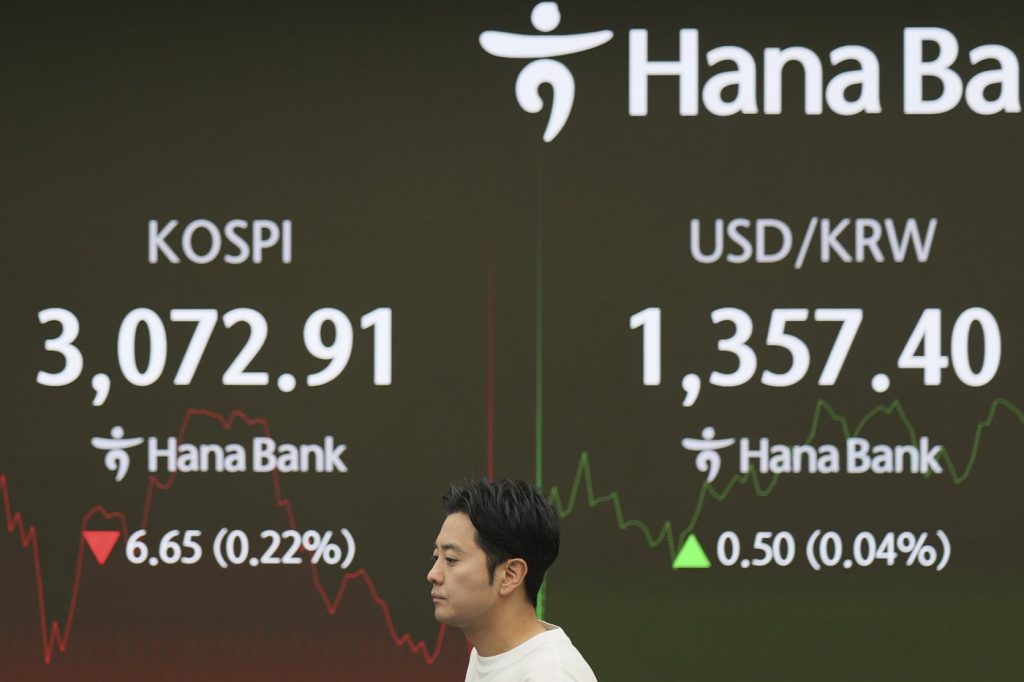MANILA, Philippines (AP) — On Friday, Asian markets experienced mostly gains following a strong performance in U.S. stocks, which approached another record high. U.S. futures and crude oil prices also recorded slight increases. Investors were attentive to recent developments regarding a trade deal signed between the U.S. and China. Commerce Secretary Howard Lutnick, during an interview on Bloomberg TV, confirmed that the deal was signed two days prior but did not provide specific details, stating that "The president likes to close these deals himself."
Concerns surrounding President Donald Trump's proposed higher tariffs have diminished since the unexpected announcement in April, but they still linger. Investors remain cautious about the size of the tariffs, their potential economic impact, and their contributions to inflation.
In the Asian markets, Hong Kong’s Hang Seng Index showed minimal change, closing at 24,333.43. The Shanghai Composite Index dipped by 0.2%, ending the day at 3,441.30. Conversely, Tokyo’s Nikkei 225 Index surged by 1.6% to reach 40,215.36, buoyed by reports indicating a slight easing in consumer prices for May. However, South Korea’s KOSPI Composite Index fell by 0.7%, closing at 3,050.01. Overall, markets have stabilized somewhat after the tumultuous aftermath of the Israel-Iran conflict.
On Thursday, the S&P 500 index experienced a notable rise of 0.8%, closing at 6,141.02, and stood just 0.05% short of its all-time closing high achieved in February. The index had briefly surpassed this milestone during the day, marking significant progress from a spring low when it dropped approximately 20% due to worries over Trump's tariffs. The Dow Jones Industrial Average saw an increase of 0.9%, ending at 43,386.84, while the Nasdaq Composite rose by 1% to 20,167.91. Positive economic reports contributed to market optimism, suggesting that the U.S. economy is enduring despite tariff-related challenges.
Recent reports indicated a surprising growth in orders for long-lasting manufactured goods, such as washing machines, exceeding economists’ expectations. Additionally, a report cited a decrease in unemployment benefit claims among U.S. workers last week, potentially signaling fewer layoffs. However, a separate analysis revealed that the U.S. economy had contracted more than initially estimated during the first quarter of 2025, driven by a surge in imports as companies sought to evade impending tariffs. Economists anticipate a stronger economic performance in the coming months.
Following these updates, Treasury yields fluctuated in the bond market but eventually eased. The yield on the 10-year Treasury note fell to 4.24% from 4.29%, while the two-year Treasury yield declined to 3.71% from 3.74%. Analysts attributed some of the pressure on yields to a Wall Street Journal report suggesting that Trump might announce his nominee for the Federal Reserve Chair position ahead of schedule, which could undermine confidence in the Fed's decision-making autonomy regarding inflation.
On Wall Street, McCormick, a spices company, experienced a robust gain of 5.3% after releasing a better-than-expected profit report and offering an optimistic full-year profit forecast, highlighting planned strategies to mitigate rising costs caused by tariffs. In the technology sector, Nvidia, a key player in artificial intelligence, recorded a modest increase of 0.5%. This surge has positioned Nvidia as the most valuable company in the U.S. stock market, with a staggering rise of 61% since April 8, significantly outpacing the S&P 500’s 23% gain. Another AI-focused firm, Super Micro Computer, also saw a significant rise of 5.7%, compounding its 55% increase since early April.
In other early trading activities on Friday, U.S. benchmark crude oil prices rose by 35 cents to reach $65.59 per barrel, while Brent crude, the international standard, increased by 36 cents to $67.05 per barrel. The U.S. dollar strengthened slightly against the Japanese yen, rising to 144.45 from 144.40 yen. However, the euro slipped to $1.1699 from $1.1703.











